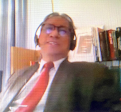A collection of research papers, incidental pieces, and thoughts in the fields of Political Science, Philosophy, Education, and Cultural Studies written at Columbia University, New York City, Athens, Ohio, Universiti Utara Malaysia, and for my column ILLUMINATIONS in Malaysiakini http://www.malaysiakini.com.
Saturday, November 12, 2005
26] Curriculum and Mass Schooling in America
ON THE HISTORICAL ACCOUNT OF MASS SCHOOLING IN AMERICA: NOTES ON KLEIBARD AND COLLIN’S PERSPECTIVE
by Azly Rahman
Columbia University, New York
Reading, comparing, and reflecting upon Kleibard’s ( 1995) and Collin’s (1979) account of the beginning of mass schooling as a State-sponsored enterprise in America, I discern the oppositional paradgmatic stand taken by the authors entailing me to question the discourse, ontology, and epistemology inherent in the words “struggle”, “history”, and “rise”.
Like the Hindu myth of Ramayana and Mahabharatta in which the struggle is those of Gods and demigods, and of Kings good and evil, over control of cosmic property and dissemination of metaphysical ideology, Kleibard’s account of describing the “Other” (i.e., those schooled and curriculum-ed) hovers within the realm of “figures” floodlighting their educational-ideological figurines on what constitute the best ideological mould to school and construct human beings in.
Thus, I sense the historical account reflecting the battle of concepts, community of scholars, and constructs. Kleibard’s interesting and linearly progressed treatment of the battle of Whites, Anglo-Saxon Protestant men with their own agenda to push under the banner of movements such as “humanists”, “developmentalists”, “social meliorists”, etc. is constructed within the conceivably well-documented historical-ideological framework. I find it tempting to believe that such a struggle actually exists as perhaps, Kleibards’s rendering of mass schooling can easily be inter-textually juxtaposed with similar accounts of such ideologically-frameworked demarcations I can find in many a mainstream liberal and neo-liberal body of literature on curriculum theorizing written in the Fernand Braudel Annales-like school of thought. How does Kleibard’s account differ then, with that of Collin’s?
Like the story of the struggle of the Parisians during the French Revolution of 1789 which overthrew King Louis Capet in which the “masses disposed their “representative of God on Earth” and the ideology of the “Sun King” reign with, Collin’s (1979) account can also be metaphored as such. His is about political-economic changes described from the point of view of waves of peoples as attempting to situate themselves or be situated in in the process of America’s mid- and late- stages of capitalist formation. Collin’s neo-Marxist interpretation (should this be a fair discursive label to put it in,) which ought to put Columbus Day celebration into the trash-can of future historizing, is about how superstructure (ideology) schooled people into the industrial and post-industrial ethos.
Unlike in Kleibard’s there is conceivably no movements nor “towering intellectual figures” propped onto center stage in the drama of the struggle for the American curriculum. Collin’s is about movement of people moved and removed in the conveyor belt of American industrial-capitalism. His account is neo-Marxist with emphasis on the ascendancy of material and cultural capital within the matrix of, borrowing Pierre Bourdieu’s terminology, “technocratic habitus”. It is about how individuals are made to participate in the rat race so that under the guise and shibboleth of technological progress, meritocracy, and social mobility, the capitalist machinery with its hidden agenda and invisible human agency can continue to reproduce people.
Whether one calls these accounts historical-functionalist or Marxist-humanist respectively, they remain as those, which attempt to describe the “Other”. Kleibard’s is good reading for mainstream middle-of-the-road educators whilst Collin’s is a welcoming breath of fresh air for post-Woodstock, survivors of the McCarthy era-type of educators for critical consciousness. These accounts are essentially and intentionally paradigmating, whose facts are grounded within their own historicity.
Must there be these two versions of history then? What is the real struggle? In what ways can a larger picture be constructed; one which looks at the discourse of curriculum historizing in a more complex fashion – like a Mandelbrott set, with the perspective of chaos and complexity theory and beyond the borders of America as a modern production house of multiple curriculum theories?
Subscribe to:
Post Comments (Atom)
Blog Archive
-
▼
2005
(48)
-
▼
November
(8)
- 31] Deconstructing Ralph Tyler's Curriculum Ideology
- 30] A Postmodern Reading of Dewey
- 29] On Thinking Like Maxine Greene
- 28] Curriculum and Postmodernism
- 27] Curriculum Theory and Postmodern Tools
- 26] Curriculum and Mass Schooling in America
- 25] Education, Curriculum, and Colonial Subjugation
- 24] Schooling and Technological Fantasy
-
▼
November
(8)
Links
About Me

- Dr. AZLY RAHMAN
- AZLY RAHMAN is an educator, academic, international columnist, and author of nine books on Malaysia and Global Affairs. He grew up in Johor Bahru, Malaysia and holds a Columbia University doctorate in international education development and Master’s degrees in six areas: education, international affairs, peace studies communication, fiction and non-fiction writing. Twitter @azlyrahman.
No comments:
Post a Comment